Cornell’s sesquicentennial celebration is getting under way, and the next set of Frank H. T. Rhodes Award winners will be honored at Homecoming in October. So we thought it was the perfect time to ask past recipients—especially those who graduated at least fifty years ago—to share memories of their days on the Hill. We also wanted to contrast their perspectives with those of current students, so we asked leaders from the Class of 2015 to answer similar questions. Their responses demonstrate that while much has changed, in many ways Cornell remains the same.
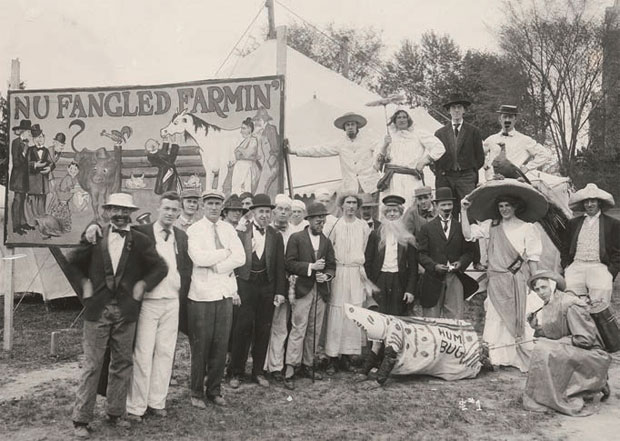
The Rhodes Award winners interviewed are Eleanor Applewhaite ’59, Ruth Zimmerman Bleyler ’62, Esther Schiff Bondareff ’37 (who, at ninetynine, is still an active Cornell volunteer), Nancy Taylor Butler ’64, William Eaton ’61, Penny Skitol Haitkin ’65, Muriel “Micki” Bertenthal Kuhs ’61, and Richard Lynham ’63, BME ’65.
From the Class of ’15, the respondents were Atticus DeProspo (president, Quill & Dagger Senior Honor Society and men’s varsity soccer player), Rachel Gerber (class convocation chair and cochair of the Orientation Steering Committee), Lipi Gupta (co-president, Hindu Student Council), Courtney Koelbel (Cornell University Sustainable Design project director), Karen Li (organizer, Cornell Organization for Labor Action), Eric Pesner (president, Cornell Demo – crats), Casey Phlegar (cross-country captain and head Reunion clerk), Thaddeus Talbot (president emeritus, Students Working Ambitiously to Graduate), and aley Velasco (editor-in-chief, Cornell Daily Sun).
Could you name a favorite professor or course?
Haitkin: My first class with Urie Bronfenbrenner ’38 still inspires me. I can vividly remember him standing at the blackboard drawing diagrams. He could easily explain so much material so clearly and relevantly, and deliver such an exciting lecture. It was truly an “aha” moment: this is what Cornell is about! (All those hours in Mann Library with reserved reading were not so exciting.) Eaton: Ernest Bangs, because he talked me into food facilities engineering in the Hotel school. I ended up taking six semesters with him and went on to a career in that field and to building the world’s largest firm practicing that discipline.
Lynham: Robert Plane, who taught firstyear chemistry and later co-founded Plane Wineries on the west shore of Cayuga Lake. He made chemistry entertaining, i.e., “Here are the reasons why you develop a hangover after too many Purple Passions.”
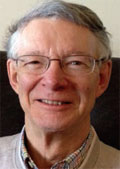
Kuhs: Vladimir Nabokov might well have become a favorite, but I never did get to study with him. After I took Russian language for a year, six mornings a week at 8 a.m., so I could take Nabokov’s famous Russian literature course, he took a sabbatical; enjoying the success of Lolita, he never returned to teach at Cornell.
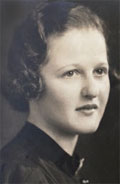
Applewhaite: I had two: Mark Roeloffs, whose Government 101 class made me change my major; and Keith Falkner, who taught voice. Vocal performance, both on and off campus, was a saving grace for me as the only African American in the class after sophomore year.
Bondareff: George Embody 1910, an entomology professor who would take us out in his boat. I remember holding trout and milking them. I also remember our biology professor, who wanted to shock us by cutting up a mouse—and an apple at the same time. It didn’t work on me.
From the students:
Velasco: My favorite course was with ILR professor Lisa Dragoni who was able to make learning about human resources and developing training programs fun and exciting.
Phlegar: Human Bonding, taught by Cindy Hazan. She was so insightful, sweet, and passionate about the course. You could tell how knowledgeable she is, and she delivered the material in a blunt way that truly resonated with our age group.
Gerber: Biometry 4030: Linear Models with Matrices. This might seem like an odd choice—but what made this class so exciting was that I could apply the material to my work outside of the course.
DeProspo: Beth Livingston, who teaches Human Resource Management in ILR. Her class taught me how I could apply concepts and strategies to real-world scenarios that provided the best incentives to motivate workers to be as productive as possible in the workplace and ensure their overall satisfaction and enjoyment with their work. Her commitment to her students, especially me, extends beyond the classroom. She also serves as the adviser to Cornell Athlete Ally, an organization we started last year to make the athletic community a more inclusive environment for LGBT individuals.
Talbot: Michael Gold is my favorite professor for two reasons: his passion for student learning and his classic sense of fashion. Gold is the only professor I know to create a “meta-quiz.” He once tested our memory of a plagiarism quiz we took for homework to guarantee that we paid attention to the examples used. I also remember walking into his labor law class for the first time as a pre-freshman. He wore a bowtie, suspenders, and pointed shoes. Since then I have earnestly tried to out-dress him, to no avail.
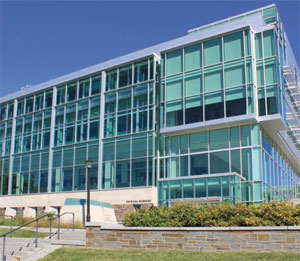
What’s your favorite building or place to go on campus?
Haitkin: Until second semester freshman year, I was too nervous to give up any available study time (curfew!) at Mann Library to venture out for coffee. In January 1962, I discovered the Straight. It was the true heart and soul of campus, and I spent (misspent?) an enormous amount of time in the Ivy Room and on the Straight Terrace.
Butler: Carpenter Library was where I got serious studying done. The place for coffee breaks: the Ivy Room, furnished with picnic tables and the jukebox playing the likes of “Runaway” and “Stranger on the Shore.”
Eaton: I ended up loving the Statler, most because I practically lived there, working three or four jobs through my last three years.
Bleyler: I often walked around Beebe Lake, by myself or with a good friend. It was a time to put studies behind, stretch my mind a bit, and solve the deeper issues of life. I skated on the lake in the winter and swam in the summer—diving near the bridge and swimming under the bridge and through the gorge.
Lynham: The Ivy Room in Willard Straight. I would have gone there more often for the ten o’clock coffee breaks, but the engineering curriculum was so loaded it was not possible to do the sort of “hanging out” that was such a large part of the non-engineer undergraduate experience.
Kuhs: This probably defines geek-dom, but I liked being in the main library (old and new buildings), and even got a job working there so I could have access to the stacks, a privilege not given to undergraduates back then. Although Olin was criticized for looking like a giant IBM punch card, the view from inside looking out at the Arts Quad was great.
Applewhaite: The Music Room of the Straight, where I could study and was introduced to much of the orchestral repertoire.
From the students:
Gerber: The Physical Sciences Building. Something about sitting at the tables by what was once the exterior wall of Baker Hall always reminds me about the scope of possibilities at Cornell—the juxtaposition of the traditional old building and the forward-thinking modern space.
Talbot: Helen Newman basketball gym is where I spend most Friday nights. After a week of hard work, it’s the best time to burn off stress, see friends, and hopefully win a few games. I’m there so often that some people refer to me as the captain of the Helen Newman basket ball team.
Pesner: Lynah Rink. I am a big fan of hockey, and I love the Cornell spirit that comes out during games.
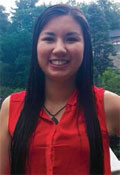
Koelbel: There are a lot of places on campus that I love, but the one I keep coming back to is JAM [the Just About Music pro gram house], my first home, and its perfor m – ance space. I lived/RA-ed there for the last three years. I loved the coffee – houses/open mic nights and concerts, and the atmosphere in the building in general.
Class of ’15: If you could go back in time to a Cornell that existed fifty to seventy-five years ago, what would you like to experience?
Phlegar: A hockey game on Beebe Lake. I’m an avid hockey fan now, but I bet the games outside were truly something to watch.
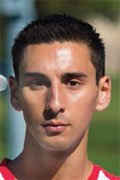
DeProspo: What Cornell was like right after the Great Depression and World War II. As an ILR student, I would be fascinated to witness the industrial and labor conditions being implemented during this time to help improve the lives of U.S. citizens.
Talbot: I would travel back to the first few Slope Days, which was then called “Spring Day.”
Li: Student involvement in the civil rights movement. Fifty years ago, the Civil Rights Act was passed. The fight for civil rights, workers’ rights, women’s rights, and so much more continues today. I think college activism and students were critical in that push, just as they are now.
Pesner: The events of the Sixties on campus. It was a time of such great social change, and it would have been exciting to have been a part of it. Change seems to happen much more slowly today than it did then.
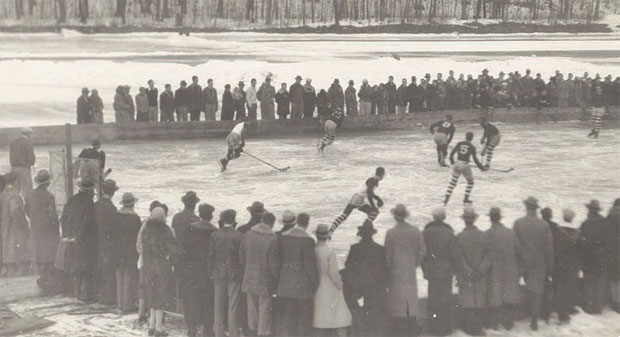
Gupta: There was amazing research happening in the physics department at that time. I would have loved to be around for the genesis of the Cornell accelerator physics program (though that was more like forty or fifty years ago). Also, Richard Feynman was at Cornell teaching theoretical physics from 1945 to 1950. I would have loved to take a class from him.
Rhodes Award winners: Is there something that existed at Cornell when you were there that you wish current students could experience?
Haitkin: Although I certainly never supported curfews or all the restrictions placed on coeds, the fact that we were all “locked up” together, shared countless tuna subs from Louie’s, and shared one corridor phone, created an immediate affinity and Cornell identity. Many programs have been initiated to offer this same secure community, those at the Carol Tatkon Center being among the most successful. I’m not sure any of these offer the same immediacy of this important first bonding.
Butler: Independence from parents.
Eaton: I think that the students were far closer to each other. They actually talked because they could not text. Social media has its place, but real conversation in the Straight was wonderful.
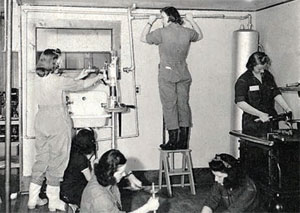
Bleyler: As the Class of ’62, we were at the tail end of “gracious living” for Cornell women, where dinners in the dorm were all together, with silver utensils, and served by waitresses (I was one of those). At the end of the meal we sang the “Evening Song” and perhaps the “Alma Mater.” As waitresses, we learned proper serving and clearing practices and got to polish silver on Saturdays.
Bondareff: That’s easy: a course on house hold engineering that was offered in CALS. As I remember, it was all women, and I’m sure the single women of today could use it. I learned about plumbing and electricity, how to change a tire—things people today could really use. It didn’t scare me at all to change a fuse or prime a pump. I still use what I learned. Last night I had a problem with the pump in the toilet; I just reached in and attached it; no problem.
Responses have been edited for length and clarity.
Our Thanks to Jim
With this issue of Cornell Alumni Magazine, we say goodbye to editor and publisher Jim Roberts ’71. After fourteen years of service and leadership, Jim is retiring.
As the owner of this publication, we take great pride in how Jim has written about Cornell, voicing it from the alumni perspective. This magazine has become more than just something Cornellians proudly place on their coffee tables; it’s something alumni discuss. Many a time we hear, “Hey, did you see that article in the Alumni Magazine?” It’s a testament to Jim, and the staff he surrounded himself with, that this publication is talked about and cherished by its readers.
On behalf of all alumni, we’d like to thank Jim and wish him the best of luck in his retirement. Of course, as an alumnus, we know we’ll be hearing from him, seeing him at alumni events, and perhaps seeing his name in a letter to the new editor.


